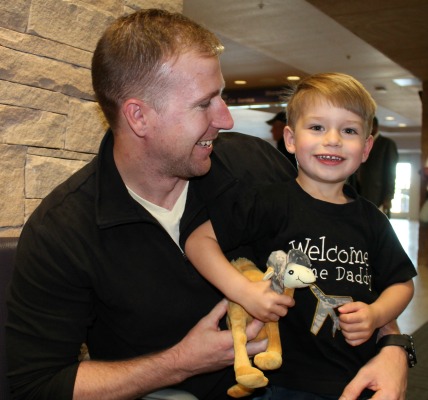To the new military spouse:
 I see you.
I see you.
You are standing by the wall at a squadron function. You alternate between timid and brazen, depending on your personality. Your eyes flit over every person there. You stay close to your significant other, even as the jargon confuses you and work conversations dominate the gathering. You smile and laugh, but I know that a part of you is intimidated. I felt just like you.
I see you.
You are saying goodbye to your spouse on a deployment or training. You are alone and far from home or family. Perhaps you have children or pets that you are now your sole responsibility. While your spouse is away for work or training, you will be in charge of everything at home. You are sad and scared to say goodbye to your partner; all military careers carry a risk to life, and what if this is the goodbye forever? I know those feelings all too well.
I see you.
You are lost in the health clinic. You are managing a budget while navigating the commissary. You are wondering what things like DONSA, ETS, and TDY mean. You are the wide-eyed person at the FRG meeting, so taken aback by all the information. You might be the spouse that asks all the questions on local Facebook pages or the spouse who calls the Key Spouse or Ombudsman for help because you are overwhelmed.
Whether you are all or none of these things, I see you.
Everyone is a new spouse once. It does not matter your age, your race, your religion, or your location. Every single one of us was the new person at one point.
You might have been new to military life entirely or just new to marriage (or both). You might have fretted and researched as much as possible about this life beforehand. Maybe you jumped into it without reproach. The experiences differ, but the fact remains the same: We were all the new spouse.
And new military spouse, I see you: because I was you.
I was the young, pregnant newlywed who had no idea what she was doing. I thought I was ready for military life, yet I had no clue what was coming. I was naive about how deployments and homecomings really are; I was intimidated by my husband’s squadron and co-workers who all seemed so confident and grown up; I was overwhelmed by military jargon, healthcare, pay, rules, and policies. No amount of reading or researching fully prepared me for this life.
Being a new spouse it challenging. There is a steep learning curve, and your life is now dictated by the military. Your daily realities are of life and death; of duty and sacrifice; of love and loss. But I took comfort in the fact that we were all new at one time. In this community, there are so many people who know exactly how you feel. These people can be your best support system and guide into this life.
We were all the new spouse. We adapted to life around physical training and mission requirements. We learned to stop everything at 1700 on a base for the national anthem. We grew immune to the booms and echoes of gunfire on the range, conveniently located by our house. We had the tough conversations about death and tragedy. We may not have always thrived, but we survived.
And now, as an “old” spouse on the other side, it is my duty to see the new spouse.
I can answer your questions or help you find an answer. I can listen to your worries and fears. When your car breaks down or your washer explodes in the middle of a deployment, you can call me to vent and to ask for help. I cannot do everything for you, but I can support you – just like other spouses did for me.
And for the more seasoned spouses, we can try to remember this: we were all the new spouse once. Have patience with the new ones. Remember those feelings of anxiety and fear from your early days. Keep in mind that this life is not for everyone; show kindness to those who are struggling. Let them know that even you have bad days and frustrating moments.
Be transparent and show the new spouses that military life is frustrating and challenging at every stage, and none of us has it fully figured out.
So new spouse, I see you. I know you. And I will support you. You may feel overwhelmed and stressed, but take it from me – you’ve got this. And if you do not, that is OK too. We all learn to survive and if I can offer you support in any way, I will. Just like the spouses did before me.











